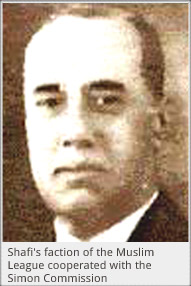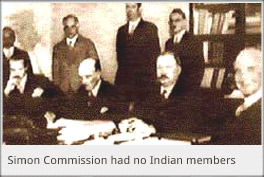The Government of India Act of 1919 was essentially transitional in character. Under Section 84 of the said Act, a statutory commission was to be appointed at the end of ten years, to determine the next stage in the realization of self-rule in India.
 The British government appointed a commission under Sir John Simon in November 1927. The commission, which had no Indian members, was being sent to investigate India’s constitutional problems and make recommendations to the government on the future constitution of India.
The British government appointed a commission under Sir John Simon in November 1927. The commission, which had no Indian members, was being sent to investigate India’s constitutional problems and make recommendations to the government on the future constitution of India.
 The Congress decided to boycott the Simon Commission and challenged Lord Birkenhead, Secretary of State for India, to produce a constitution acceptable to the various elements in India.
The Congress decided to boycott the Simon Commission and challenged Lord Birkenhead, Secretary of State for India, to produce a constitution acceptable to the various elements in India.
There was a clear split in the Muslim League. Sir Muhammad Shafi, who wanted to cooperate with the commission, decided to convene a Muslim League session in Lahore in December 1927.
 The other faction led by Jinnah stood for the boycott of the commission. This faction held a Muslim League session at Calcutta, and decided to form a subcommittee to confer with the working committee of the Indian National Congress and other organizations, with a view to draft a constitution for India.
The other faction led by Jinnah stood for the boycott of the commission. This faction held a Muslim League session at Calcutta, and decided to form a subcommittee to confer with the working committee of the Indian National Congress and other organizations, with a view to draft a constitution for India.
This article was last updated on Sunday, June 01, 2003






